Corsair Obsidian 550D: Starting to Specialize
by Dustin Sklavos on March 29, 2012 3:01 PM EST- Posted in
- Cases/Cooling/PSUs
- Corsair
- mid-tower
Noise and Thermal Testing
Since we currently only have test results for the Corsair Obsidian 550D based on our new testbed and methodology, this is going to be a relatively short breakdown. Still, there's useful information to be had.
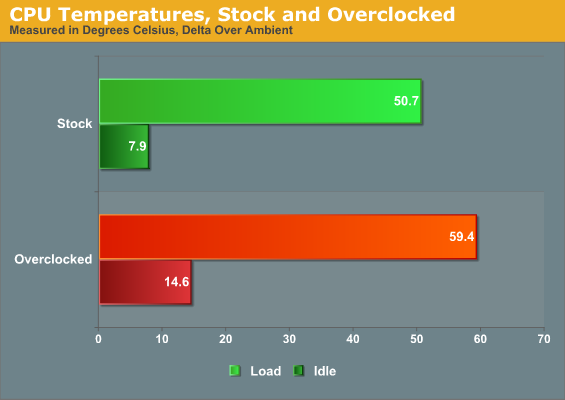
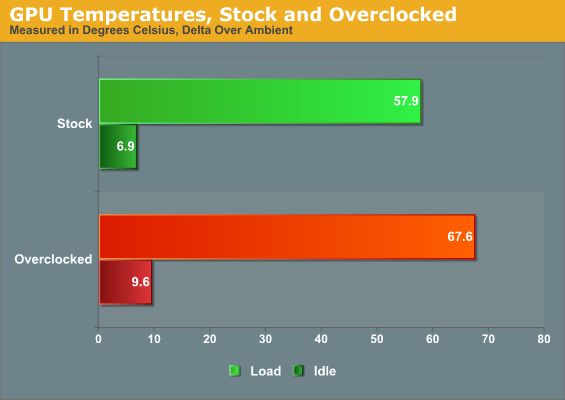
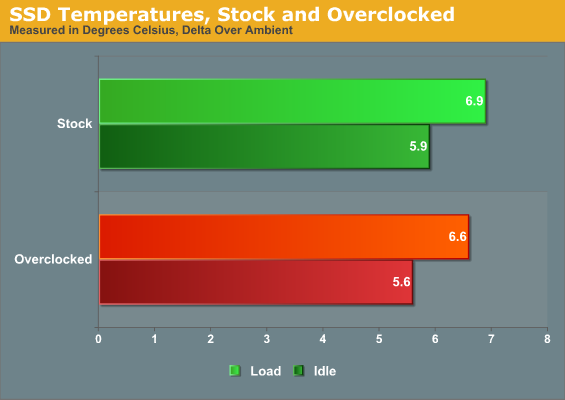
Under the new testing rubric it can be a little difficult to figure out what's going on. First, we can see the CPU and GPU both get about a 10C increase in temperature when overclocked in the Obsidian 550D, while idle temperature increases are nowhere near as severe. The ambient temperature when testing was ~22C, which would result in absolute thermals in the 80s for the CPU...not the greatest results but not dangerous either. GPU thermals are at the 90C threshold, but when you see our fan speed results you'll see the GTX 560 Ti still has some headroom before actually overheating. Meanwhile, the SSD temperatures are within the margin of error; the increased stress from the CPU and GPU in the overclocked configuration doesn't impact the SSD in any noteworthy way.
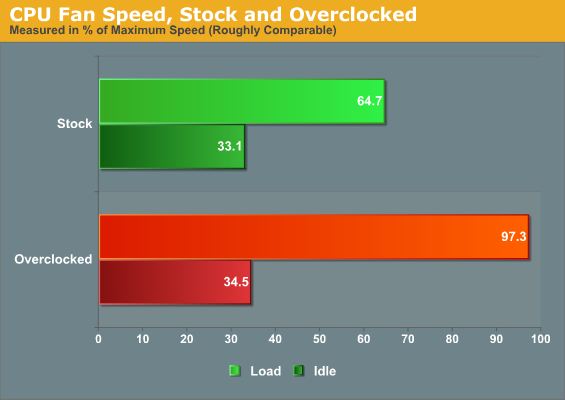
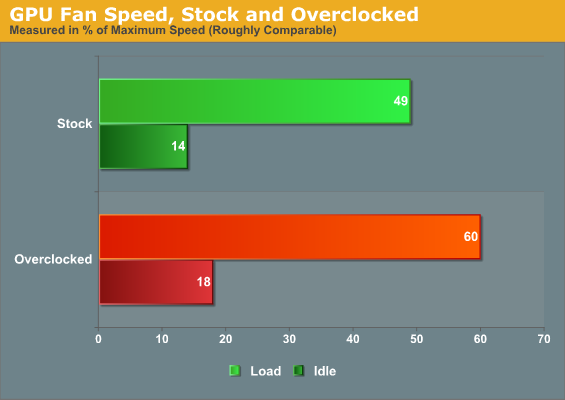
While thermal performance isn't horrible, the fans definitely had to work reasonably hard to keep things under control. The Hyper 212 Evo's fan is virtually maxed out by the thermal load; in practical terms, the 550D in its stock configuration just doesn't seem to have that much of a ceiling for CPU overclocking. Meanwhile, the 560 Ti's fan speed gets a substantial enough jump to prove noticeable, but end users who demand more power will likely meet the limitations of the silicon itself before they hit the limits of the cooling system.
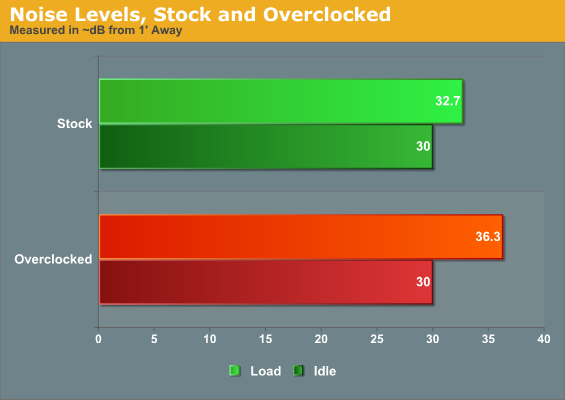
Since 30dB is the floor for our sound meter, we can safely say the Corsair Obsidian 550D is able to keep things under control while the system is idling, regardless of whether or not the components are overclocked. Under load the 550D remains very quiet; in a silent room the difference is noticeable, but in practical use it's far less likely. Unfortunately, when overclocked the 550D has a harder time keeping the noise down; the high pitch of the GTX 560 Ti's fan, in particular, makes itself known.










59 Comments
View All Comments
zcat - Thursday, March 29, 2012 - link
It's not just you.There is no good reason anymore, imo, for full-size ATX systems, unless you really *need* all those extra bays for internal HDDs as a file server, and/or you need more than the 4 expansion slots that microATX offers (maximum) in a space_heater/gaming_rig for something like 2x double-wide video cards + audio + h/w raid + "futureproof-something".
If you search newegg, you'll find that there's almost as many microATX motherboards for sale as there are ATX at very similar prices, and many of the microATX cases even approach the size of full ATX.
In fact, the vast majority of people, even hardcore gamers, could opt for miniITX (vs microATX), as long as they choose one of the few cases that can fit a single full-height & full-length & double-width video cards (like the Sugo's or a few of Lian Li's). Room enough for 2 8GB sticks of ram, an SSD, and HDD, but no insane CPU coolers.
Risforrocket - Thursday, March 29, 2012 - link
Can you give me one reason that is relevant to me why I should use a small case for my computer?I think of my computer as a workstation, it has to do everything. And it does. Yes, it has a RAID card and 4 drives in RAID. Yes, it has a full sized ATX deluxe motherboard. Is that ok with you? I also don't believe in water cooling so I like plenty of room for the air to flow around and I like plenty of full sized low speed fans.
Some day I might build a mini computer to use for... well, something. Maybe as a music/video player. Until then I guess I'll just keep on building my big beautiful workstation computers for no good reason and put things in there that I don't really need.
zcat - Friday, March 30, 2012 - link
So YOU are utilizing the extra space -- good for you -- but most people don't.Good reasons to go smaller when you can -- which is most of the time -- is to save on wasted space, materials, and energy. It's called being efficient for the increasingly common case.
JarredWalton - Thursday, March 29, 2012 - link
My experience is that mATX with a high-end graphics card (e.g. GTX 580 or HD 7970 or similar) is going to either run hot, run loud, or both. Mini-ITX is almost impossible to get a reasonably quiet system with a high-end GPU. Meanwhile, if you look at our previous tests of full-towers, there's a reason many of them are quieter and run cooler than mid-towers, never mind mATX.So unlike those who "see no use for full ATX anymore", I'm the exact opposite: unless space is at a premium, I see no use for mATX. I have three desks, and they all have a spot for a mid-tower. If I had an mATX case instead of my current case, all I'd end up with is a foot of empty space above the box.
In case you're wondering, my current main desktops are using a SilverStone Raven (dual 5870 GPUs), an older Lian Li PC7 (single GTX 580 -- this case was not good for dual GPUs), an old Gateway FX530 with a single slot GPU for the display and a dual-slot GPU for GPGPU work (5670 and 5850 currently installed), and the last is some weird Ultra case that was designed to be high-end but really isn't... but it still works well enough for my wife's PC.
zcat - Friday, March 30, 2012 - link
If highest-end SLI + RAID5 are in your vocab, then, sure, you probably want full ATX, else microATX usually strikes the best balance, especially if you choose your case wisely (for silence & air flow).My perspective is that of 'good enough' systems (~80th percentile performance) where you save on money, energy, and space by default; not on building the 98% BEST gamer/workstation systems.
7Enigma - Thursday, April 5, 2012 - link
I'm in complete agreement with you Jarred as well. I think a lot of people like the wow factor of cramming a bunch of components into a shoe box. I'm not one of them. I, like you, would have no use for the extra bit of space a smaller enclosure/mobo would provide (actually it'd be MORE annoying as I'd have to bend down farther to turn on), not to mention the increased difficulty during the build/upgrade as components are closer together, and the increased heat issue of having power-hungry parts adjacent to each other.If you're a mobile gamer or living in a dorm room where every inch counts I get it. But for a large percentage of people I just don't see the attractiveness of a smaller form factor.
kenyee - Thursday, March 29, 2012 - link
If you're comparing a case on noise/cooling, it'd be really useful to compare it to other cases in this price range like most other sites do.There was mention that the design copied some of the techniques from Fractal Design's cases, but no comparison on performance. I'd have loved to have seen a comparison with the Fractal Define R3 which I think is a direct competitor with possibly less plastic. Newegg's comments also mentioned a lot of damaged cases during shipping so I'm surprised you didn't talk about the packing since you talked about aesthetics ;-)
kyuu - Thursday, March 29, 2012 - link
Please read the article. The reason there are no cases for comparison is stated on the very first page: they revised their testbed and methodology and, therefore, results from previously reviewed cases are not directly comparable.ExarKun333 - Friday, March 30, 2012 - link
Then AT needs to do a 'silent case' or 'performance case' or the like shootout to get some numbers. The new methodology makes great sense, but what is a review with nothing to compare it to?ggathagan - Friday, March 30, 2012 - link
So you would have them wait until they've tested 3 or 4 cases and *then* put out the results? No thanks.It's a new test bed and new methodology. They have to start somewhere.